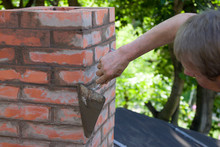Chimney Masonry Repair: Restoring Strength, Safety, and Beauty to Your Home
Wiki Article
A well-built chimney adds both charm and functionality to any home, but over time, experience weather as well as heat can cause injury to its masonry structure. Cracks, loose bricks, and deteriorating mortar joints not only diminish your property’s appearance but also pose serious safety hazards. Chimney masonry repair is vital to maintain the integrity, efficiency, and safety of one's fireplace system.

Common Signs Your Chimney Needs Masonry Repair
Recognizing early indications of damage can prevent costly repairs in the future. Here are the most typical issues homeowners encounter:
Cracked or Spalling Bricks: Moisture infiltration and freeze-thaw cycles might cause bricks to hack or flake.
Crumbling Mortar Joints: Over time, mortar deteriorates due to constant experience rain, snow, and high temperatures.
Leaning Chimney Structure: A leaning or tilting chimney indicates foundational or structural damage that needs immediate attention.
Water Stains and Leaks: Moisture inside your home near the chimney area may signal cracks or missing chimney caps.
Efflorescence: A white, powdery deposit about the chimney surface is a sign that water is seeping over the masonry.
Types of Chimney Masonry Repair
Depending around the type and extent of injury, professional chimney masons are able to use different techniques to restore your chimney:
1. Tuckpointing (Repointing)
Tuckpointing involves removing deteriorated mortar from your joints and replacing it with new mortar that matches the original color and texture. This process not merely improves the appearance of the chimney but in addition strengthens the structure and prevents water infiltration.
2. Brick Replacement
If some bricks are severely damaged or missing, professionals will remove and replace them with matching materials to keep up the chimney’s original look and strength.
3. Chimney Crown Repair
The chimney crown, located at the very top, protects the masonry from rain and snow. Cracks or gaps inside the crown can allow water to seep in, ultimately causing serious structural damage. Repairing or rebuilding the crown helps maintain the entire chimney watertight.
4. Waterproofing
Applying a breathable waterproof sealant towards the chimney surface prevents moisture absorption while allowing trapped vapors to leave. This helps prolong the life of the bricks and mortar.
5. Rebuilding
In cases of extensive damage or neglect, partial or full chimney rebuilding may be required. Skilled masons can reconstruct the chimney using durable materials and proper processes to ensure safety and longevity.
Why Chimney Masonry Repair Is Important
Neglecting chimney repairs can bring about serious problems, including:
Structural Instability: Crumbling masonry may cause the chimney to collapse.
Fire Hazards: Cracks enables hot gases and embers to leave into the home’s structure.
Water Damage: Moisture infiltration brings about mold, rot, and damage to surrounding walls.
Reduced Efficiency: A damaged chimney affects ventilation, leading to poor fireplace performance.
Timely chimney masonry repair ensures your own home remains safe, energy-efficient, and visually appealing.
Professional Chimney Repair Services
While minor cracks might seem easy to fix, chimney masonry repair requires expertise and also the right tools. Professional chimney masons can inspect, diagnose, and repair damage using proper materials and techniques that meet safety standards. They also search for related issues like liner damage, flue obstructions, and water leaks to ensure a complete and lasting solution.
Your chimney endures harsh weather, intense heat, and time — which can take a toll on its masonry structure. Regular inspection and masonry repair are very important for maintaining the security, efficiency, and aesthetics of one's home. Whether you may need minor tuckpointing or a full rebuild, professional chimney repair specialists can restore your chimney to its original strength and beauty.